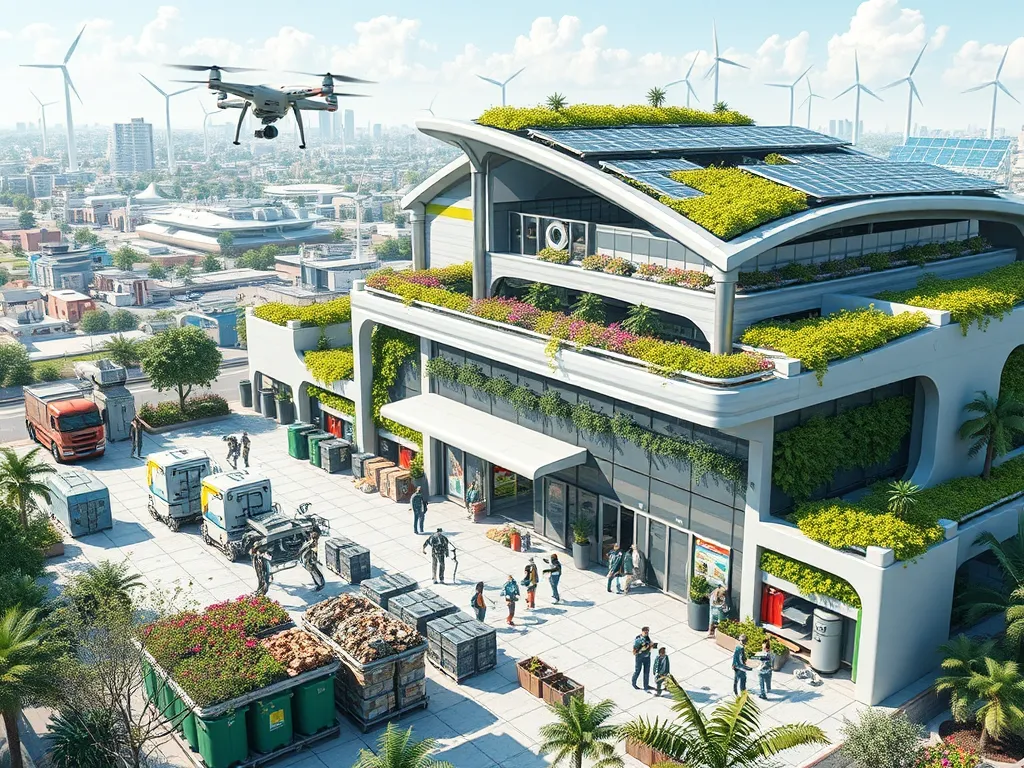Innovative Strategies for Future Waste Management Solutions

Future Waste Management: Innovations and Sustainable Practices
The future of waste management is a critical concern as urban populations and consumerism continue to rise. The escalation of waste generation poses significant challenges to environmental sustainability, prompting the need for innovative solutions. Future waste management increasingly focuses on integrating technology, sustainable practices, and educational initiatives that collectively aim to enhance efficiency in waste disposal, recycling, and overall resource management.
With the rapid advancement of technology, the landscape of waste management is evolving. The integration of smart systems, artificial intelligence (AI), and molecular recycling technologies signify a transformative phase in managing waste effectively. As societies become more technologically oriented, the reliance on these innovations will dictate future waste management strategies that can adapt to generate less waste and improve recycling processes.
Moreover, sustainable practices are paramount to future waste management. Concepts such as the circular economy, which emphasizes reusing and recycling materials to minimize waste, are gaining traction. Communities are also gravitating towards zero-waste lifestyles, pushing for comprehensive composting systems and responsible waste disposal methods. These practices play a pivotal role in promoting resource conservation, minimizing landfill usage, and fostering a culture of sustainability.
Governments at various levels are increasingly recognizing the importance of policy and regulation in waste management. Global and local initiatives are being implemented to curb waste generation through legislative frameworks that support sustainability. Stricter regulations on plastic waste reduction are being enforced, with incentives tailored for both industries and consumers alike. These policy advancements are crucial for creating a conducive environment for sustainable waste management practices to thrive.
Public awareness and education are key components of enhancing waste management systems. Engaging communities through educational campaigns and social media platforms can significantly shift public perceptions regarding waste disposal. Collaborations with schools can foster early education on recycling and sustainability. This multifaceted approach not only empowers individuals but also prepares future generations to take responsible actions toward waste management.
Technological Innovations in Waste Management
One of the most promising advancements in future waste management is the implementation of smart waste collection systems. These systems utilize IoT (Internet of Things) devices to monitor waste levels in bins, optimizing collection routes and reducing operational costs. This data-driven approach enhances service efficiency and minimizes the environmental impact of waste collection vehicles.
The comprehensive report by UNEP highlights innovative strategies for sustainable waste management worldwide.
Artificial Intelligence (AI) is transforming waste sorting processes as well. AI-powered automation can identify and separate recyclable materials from general waste with high precision. This technology not only streamlines recycling operations but also significantly reduces human error and increases the recovery rates of valuable materials.
The future of waste management also relies on biodegradable materials that contribute to waste reduction. By substituting traditional plastic products with biodegradable alternatives, the amount of waste sent to landfills can be significantly reduced. Innovations in material science are paving the way for fully biodegradable packaging that minimizes environmental footprint while maintaining functionality.
Waste-to-energy technologies are another critical innovation in this field. By converting waste materials into energy through combustion or anaerobic digestion, communities can reduce landfill entries while generating renewable energy. This not only addresses waste disposal issues but also fosters energy independence and supports local economies.
Sustainable Practices in Waste Management
Circular economy principles are revolutionizing how society views waste. By designing products with their entire lifecycle in mind, we can reduce resource consumption and waste generation. This model encourages businesses to create products that are easier to repair, reuse, and recycle, thus diminishing the pressure on landfills and natural resources.
The zero-waste lifestyle is a growing trend encouraging individuals and communities to minimize waste generation. Strategies such as reducing consumption, reusing items, and recycling can collectively lead to zero waste outputs. Implementing local initiatives that promote these strategies can instill a culture of mindful consumption among citizens.
In urban areas, composting techniques are becoming an essential aspect of sustainable waste management. By diverting organic waste away from landfills and transforming it into nutrient-rich compost, cities can naturally reduce methane emissions and enhance soil health. Urban composting initiatives also promote community involvement and can serve as educational tools for sustainable practices.
Recycling programs are instrumental in creating a sustainable waste management framework. Their effectiveness determines the success of waste reduction efforts. Comprehensive recycling initiatives that provide convenient disposal options encourage public participation and can significantly impact material recovery rates, keeping valuable resources in circulation.
Policy and Regulation in Waste Management
Global waste management policies are evolving to address the urgent need for sustainable practices. International agreements aim to reduce plastic waste and improve waste management standards worldwide. Such policies provide frameworks for countries to develop their strategies that align with global sustainability goals.
Local government initiatives play a crucial role in implementing waste management policies that resonate with community needs. Tailored approaches, such as local recycling schemes or public cleanup events, can drive grassroots movements towards sustainable waste management, fostering community commitment to practical solutions.
Regulations targeting plastic waste reduction have been gaining momentum internationally. Prohibitions on single-use plastics and mandates for reduced plastic packaging compel businesses to innovate. This regulatory environment encourages the development of sustainable alternatives and practices, incentivizing industries to adopt greener methods.
Governments are introducing incentives for sustainable waste management, such as tax benefits for companies that adopt eco-friendly practices. These incentives not only boost corporate responsibility but also encourage consumers to participate in recycling and waste reduction initiatives, creating a collaborative platform for sustainability.
Public Awareness and Education
Community engagement in waste programs is crucial for fostering cooperation and awareness. Initiatives that involve local residents in recycling and cleanup efforts can strengthen communal ties while promoting responsibility toward waste management. Active participation builds a sense of ownership and accountability among community members.
Educational campaigns focusing on waste reduction are vital for changing norms and behaviors. By highlighting the impact of waste and providing practical solutions for reducing it, these campaigns empower individuals to take action. Schools, businesses, and local organizations can collaborate to disseminate knowledge effectively.
The role of social media in waste awareness is growing, offering platforms for sharing information on sustainable practices. Campaigns that utilize social networks can reach broader audiences, encouraging them to reconsider their waste habits and engage in community-driven initiatives.
Collaborating with schools for recycling education lays the foundation for lifelong sustainable habits. Educational programs that teach children the importance of recycling and waste management can cultivate a generation that prioritizes environmental stewardship, further perpetuating a culture of sustainability.
Future Trends in Waste Management
The impact of climate change on waste strategies is becoming increasingly significant. As environmental conditions shift, waste management systems must adapt to ensure resilience against climate-related challenges, such as floods and extreme weather events that can disrupt waste collection and processing.
Emerging technologies in recycling, such as advanced sorting machines and chemical recycling processes, are shaping the future of waste management. These innovations will enhance recycling capabilities, allowing for a wider range of materials to be processed and increasing overall recycling rates.
Future job markets in waste management are expected to expand as industries evolve to meet sustainability demands. New roles in sustainability consulting, waste data analytics, and eco-friendly product design are likely to emerge alongside traditional waste management positions, presenting diverse career opportunities.
Trends in waste collection and disposal will lean towards more integrated and smart systems that leverage data and technology. Communities will witness an evolution in operational efficiencies, with a focus on sustainable practices that prioritize environmental considerations while managing urban waste effectively.
